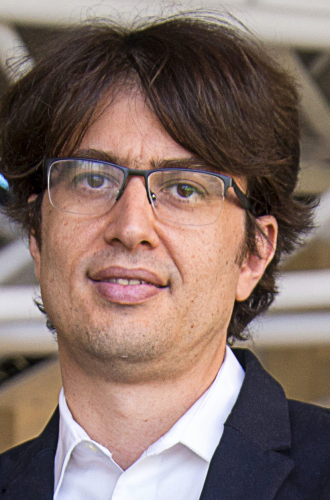-

-

-
David Soloveichik
Associate Professor
Chandra Department of Electrical and Computer Engineering
Temple Foundation Endowed Faculty Fellowship No. 4 (Holder)Dynamic DNA nanotechnology; chemical and unconventional computation.-
David Soloveichik received his B.S. and M.S. degrees from Harvard University in Computer Science in 2002. He completed his Ph.D. degree in Computation and Neural Systems at the California Institute of Technology in 2008, where his dissertation was awarded the Milton and Francis Clauser Doctoral Prize for the best doctoral thesis. Subsequently, David was a Computing Innovations Fellow and a Fellow at the Center for Systems and Synthetic Biology at the University of California, San Francisco. He joined The University of Texas at Austin as an Assistant Professor at the Department of Electrical and Computer Engineering in 2015.
David was the recipient of the Feynman Prize in Nanotechnology (Theory) from the Foresight Institute in 2012, and the Tulip Award from the International Society for Nanoscale Science, Computation and Engineering in 2014 which recognizes “the DNA Computer Scientist of the Year.” He received the National Science Foundation CAREER Award in 2016, and the Sloan Research Fellowship in 2020.
-
Our lab is interested in the engineering of complex molecular systems for nanotechnology and synthetic biology using bottom-up computer science and electrical engineering principles, as well as using formal models of computing to discover the potential and limits of chemical information processing.
Biology relies on smart molecular systems to control internal state, communicate using chemical signals, perform nanoscale assembly, and effect physical motion—each of these tasks coordinated by chemical information processing circuits. If we can learn how to rationally engineer molecular computing systems, we could achieve breakthroughs in medicine, manufacturing, and information storage. For example, “smart drugs” that target drug activity to diseased cells by activating in response to combinatorial molecular cues could have minimal side effects and improve therapeutic outcomes. Programmed molecular self-assembly could be used for the massively parallel construction of nanoscale devices. However, a vast gulf currently exists between the remarkable chemical complexity exhibited by biology, and our limited engineering ability of such systems.
Although it is not surprising that current bioengineering efforts are largely guided by biological paradigms, effective engineering of complex functional molecular systems might take paths divergent from biology (in the same way that airplanes do not fly by flapping their wings). Hence we are pursuing a bottom-up approach to create smart molecules based on the principles of computer science and electrical engineering. These principles have already proven remarkably successful in enabling the digital electronics age. Our research combines wet-lab experimental work with the principled development of new models of computing that help guide programming of molecular function.
-
- G Seelig, D Soloveichik, DY Zhang, E Winfree, “Enzyme-Free Nucleic Acid Logic Circuits,” Science 314: 1585-1588 (2006).
- D Soloveichik, E Winfree, “Complexity of Self-Assembled Shapes”, SICOMP: SIAM Journal on Computing 36: 1544-1569 (2007).
- D Soloveichik, G Seelig, E Winfree, “DNA as a Universal Substrate for Chemical Kinetics”, PNAS: Proceedings of the National Academy of Sciences, USA 107: 5393-5398 (2010).
- YJ Chen, N Dalchau, N Srinivas, A Phillips, L Cardelli, D Soloveichik*, G Seelig*, “Programmable chemical controllers made from DNA”, Nature Nanotechnology 8: 755-762 (2013).
- HL Chen, D Doty, D Soloveichik, “Deterministic Function Computation with Chemical Reaction Networks”, Natural Computing 13: 517-534 (2014).
- N Srinivas, J Parkin, G Seelig, E Winfree, D Soloveichik, “Enzyme-free nucleic acid dynamical systems.” Science 358: eaal2052 (2017).
- D Doty, D Soloveichik, “Stable leader election in population protocols requires linear time”, Distributed Computing 31: 257-271 (2018).
- B Wang, C Thachuk, AD Ellington, E Winfree, D Soloveichik, “Effective design principles for leakless strand displacement systems”, PNAS: Proceedings of the National Academy of Sciences, USA 115: E12182-E12191 (2018).
- C Chalk, N Kornerup, W Reeves and D Soloveichik, "Composable Rate-Independent Computation in Continuous Chemical Reaction Networks", IEEE/ACM Transactions on Computational Biology and Bioinformatics (2019).
- K Breik, C Chalk, D Haley, D Doty and D Soloveichik, "Programming Substrate-Independent Kinetic Barriers with Thermodynamic Binding Networks", IEEE/ACM Transactions on Computational Biology and Bioinformatics (2019).
- B Wang, C Chalk, D Soloveichik, “SIMD||DNA: Single Instruction, Multiple Data Computation with DNA Strand Displacement Cascades,” DNA25: International Conference on DNA Computing and Molecular Programming, Lecture Notes in Computer Science 11648: 219-235 (2019).
- M Vasic, C Chalk, S Khurshid, D Soloveichik, “Deep Molecular Programming: A Natural Implementation of Binary-Weight ReLU Neural Networks,” ICML’20: International Conference on Machine Learning (2020).
-
- Best Student Paper in DNA10: International Conference on DNA Computing and Molecular Programming (2004)
- ARCS Foundation Scholarship (2005)
- Best Student Paper in DNA14: International Conference on DNA Computing and Molecular Programming (2008)
- Milton and Francis Clauser Doctoral Prize for best Caltech PhD thesis of the year (2008)
- Computing Innovation Postdoctoral Fellowship (2009)
- Finalist, Burroughs Wellcome Fund Career Award at the Scientific Interface (2011)
- Feynman Prize in Nanotechnology (Theory) from the Foresight Institute (2012)
- Tulip Award from the International Society for Nanoscale Science, Computation, and Engineering (ISNSCE) recognizing “the DNA Computer Scientist of the Year” (2014)
- Best Paper in DISC'14: International Symposium on Distributed Computing (2014)
- NSF CAREER (2016)
- ECE Capstone Project-First Place Team (Industry category) (2017)
- Best Paper in CMSB'18: Computational Methods in Systems Biology (2018)
- Best Student Paper in DNA25: International Conference on DNA Computing and Molecular Programming (2019)
- Sloan Research Fellowship (2020)
- Best Student Paper in DNA26: International Conference on DNA Computing and Molecular Programming (2020)
-
Undergraduate:
- EE360C Algorithms
Graduate:
- EE381V Programming with Molecules
- EE381V/CS395T Unconventional Computation
-
Currently accepting new graduate students.
-



